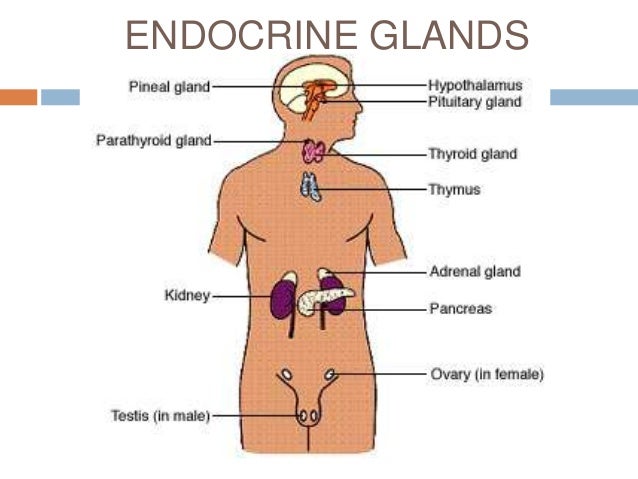
There are numerous differences between an endocrine gland and an exocrine gland. To summarize the main differences between the two types of glands in a general sense, the terms internal and external come to mind. Endocrine glands secrete hormones into the body’s internal environment to cause a specific action to occur. Exocrine glands release secretions that follow pathways that lead to external areas (Shier, Butler, & Lewis, 2016).
Endocrine glands secrete hormones into the bloodstream to travel to distant, internal areas and cause specific actions that affect the body’s metabolism and many other processes. Some examples of major endocrine glands include the thyroid, hypothalamus, pituitary, adrenal, testes and ovary. Each endocrine gland secretes specific hormones to effect certain actions within the body. The hormones travel through the bloodstream until they reach their designated target cells to initiate the desired action or effect. An example of a specific action would be the thyroid gland secreting T3 and T4 hormones into the blood stream. These hormones travel through the bloodstream to their target cells. The desired action that results can include enhancing the speed of protein synthesis, lipid breakdown or cellular energy release from carbohydrates (Briers, 2012).
Exocrine glands produce secretions that travel through tubes or ducts to external regions of the body to cause specific effects. Examples of some of the major exocrine glands include sweat, mammary, salivary, tear and mucous. An example of a exocrine gland in action would be the salivary glands which produce saliva in the mouth, to aid in digestion, help prevent bacteria buildup and tooth decay and to enhance the ability to swallow. Another example would be sweat glands secreting sweat droplets on the skin’s surface, to aid in temperature regulation (Crampton, 2016).
While most of the endocrine and exocrine glands have very different, unique roles and functions, there are some glands that pull double duty as a combination of both types of glands. The pancreas produces enzymes which aid in digestion as an exocrine function, while also secreting insulin into the bloodstream, to aid in controlling blood glucose levels, which is an endocrine function. The liver also has a multifaceted capability, in that it produces bile in an exocrine manner, but also secretes plasma proteins into the bloodstream as an endocrine function. These diverse glands have important and amazing roles, in assisting with keeping the human body functioning properly (Davis, 2016).
References:
Shier, D., Butler, J., & Lewis, R. (2016). Hole’s human anatomy and physiology (14th ed.). New York, NY: McGraw-Hill.
Briers, D. (2012). The Difference Between Endocrine and Exocrine Glands. DBriers. Retrieved from http://www.dbriers.com/tutorials/2012/08/the-difference-between-endocrine-and-exocrine-glands/
Davis, K. (2016). Exocrine Pancreatic Insufficiency: What You Need to Know. MNT. Retrieved from http://www.medicalnewstoday.com/articles/310292.php.
Crampton, L. (2016). Interesting Facts about Saliva and Salivary Glands. Owlcation. Retrieved from https://owlcation.com/stem/Interesting-Facts-About-Saliva-and-Salivary-Glands
Photo Credit: http://www.slideshare.net/LadyRixi/endocrine-glands-22547640
Eric Dempsey
MS, ISSA Master Trainer












No comments:
Post a Comment